HOW CAN WE HELP YOU? Call 1-800-TRY-CHOP
In This Section
Joy and Persistence: Stories from Women in STEM at CHOP
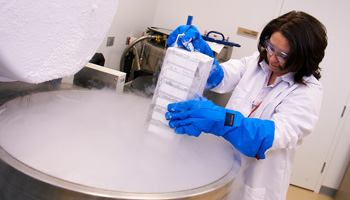
Join us in celebrating Women’s History Month, and read about what drives these researchers, their words of wisdom, and why they do what they do.
Science knows no boundaries, and neither do our researchers working in science, technology, engineering, and math (STEM) fields. Though these areas historically have been underrepresented by women, in 2020, female scientists at Children’s Hospital of Philadelphia Research Institute continue to lead innovative and inspiring research in their respective fields, driven by their mission to advance children’s health.
To celebrate Women’s History Month, we are once again continuing our tradition of highlighting these talented researchers. This year, we are excited to share these profiles across a two-part series in which each nominee, elected by a Research Institute Center of Emphasis leader, shares her STEM stories. Whether it’s what motivates them to conduct their research, what they’re working on right now, or simple words of wisdom and advice, this collection is bound to inspire the next generation of individuals pursuing careers in science and medicine. Meet our 2020 Women in STEM (Part One)!
Naiara Aquizu Lopez, PhD
Researcher
Raymond G. Perelman Center for Cellular and Molecular Therapeutics
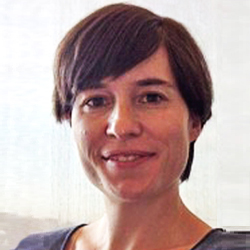
Naiara Aquizu Lopez, PhD
My research is focused in understanding how genes control human brain diversity in healthy and disease conditions. As someone who grew up in the era of the human genome sequencing, I always have been fascinated by genetic research. Moreover, since my childhood, I have been inspired by Rita Levi-Montalcini, one of the few female Novel Laureates, who devoted her life to neurobiological research. My research interest is thus the convergence of my two passions and is highly motivated by our need to better understand how our brain works and uncover treatments for brain disorders, most of which remain incurable.
My advice for anyone, especially for women in STEM careers, is to simply enjoy what they do. Joyfulness is the strongest driver of motivation and self-confidence, two features that are essential to succeed in our work and overcome adversities that we often encounter in our paths.
Kristy Arbogast, PhD
Co-scientific Director and Director of Engineering
Center for Injury Research and Prevention
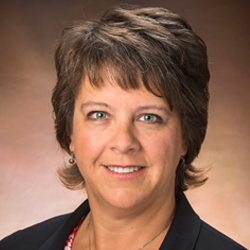
Kristy Arbogast, PhD
My research is focused on pediatric injury research and prevention — biomechanics, injury causation and characterization, effectiveness of safety products/equipment, and injury recovery — in two primary areas of emphasis: motor vehicle crashes and concussions. I am passionate about these areas of research because they directly impact the everyday lives of families. Virtually everyone interacts with a vehicle in some way or has experience with, or cares about, concussions in youth.
Our Center’s mission of “Research to Action to Impact” allows us to focus on applied research. Many stakeholders, for example, industry, government, policymakers, are waiting for our research findings so they can act to improve the safety of a large population of children and youth. That tangible benefit is what drives my work — knowing that as an engineer working at CHOP I can influence in a positive way the lives of children not only in my immediate family but broadly throughout the world.
My advice for women pursuing STEM careers: preparation and opportunity. Do not shy away from subjects that you are interested in because of preconceived notions or others’ opinions that these topics are not typically of interest to women. Become as facile with the technical topics as your classmates, regardless of their sex. Plan and chart an educational and career course, but feel comfortable deviating from that plan when an opportunity that you are passionate about presents itself. Feel comfortable stepping forward and taking that opportunity.
Pamela F. Weiss, MD, MSCE
Clinical Research Director, Division of Rheumatology
Clinical Futures
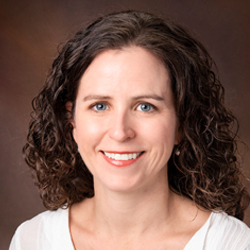
Pamela F. Weiss, MD, MSCE
Across the world, spondyloarthritis is one of the most common forms of juvenile arthritis. It is a disease characterized by arthritis of joints like knees and elbows, as well as the lower back and spine, along with sore tendon insertions, gut inflammation, painful eye inflammation, and psoriasis. These children are at risk of progression to ankylosing spondylitis, which is characterized by fusion of the joints, loss of function, pain, and psychologic impact that lasts into adulthood. We lack effective therapies for this condition, and fewer than 20 percent of children with spondyloarthritis achieve remission within five years of diagnosis.
Efficacy and effectiveness studies are critically needed for this understudied pediatric population. I have devoted my career not only to making these studies happen but also to translating the findings from the studies into tangible improvements in the everyday approach to caring for these children. Some of the work I have done with my team at CHOP addresses questions like: How can we optimize evaluation at diagnosis so we know the full extent of disease? How can we best optimize our use of state-of-the-art imaging for evaluation of disease activity and progression? Which treatments work the best for particular disease features? Once children are in remission, how should we approach de-escalation of therapy?
STEM careers are fulfilling and challenging. Simply stated: I love being a pediatric rheumatologist. I strive every day to provide superior clinical care for children with rheumatic disease, use pediatric rheumatology as a platform to share my enthusiasm with students at all levels, and make meaningful contributions to advancing the care of children with vasculitis and juvenile arthritis through my clinical research activities.
Catherine C. McDonald, PhD, RN, FAAN
Nurse Researcher
Center for Injury Research and Prevention
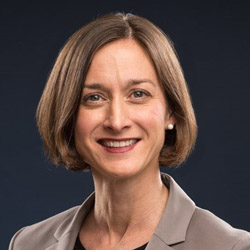
Catherine C. McDonald, PhD, RN, FAAN
My research focuses on adolescent injury prevention, in particular adolescent motor vehicle crash (MVC) prevention. I chose this because MVCs are the leading cause of death in adolescents — and they are largely preventable. As a nurse scientist, it was obvious to me that in order to promote adolescent health and support later positive adult health outcomes, we need to prevent adolescent MVCs.
Follow your passion, don’t be afraid to try new things, and be confident. For young women who are interested in studying nursing — remember nursing is STEM! For optimal delivery of clinical care, science, technology, engineering, and math are all critical to nursing practice and research. In any one given patient interaction, all facets of STEM can be integrated to help promote healthy outcomes.
Suzanne P. MacFarland, MD
Attending Physician, Division of Oncology
Center for Childhood Cancer Research
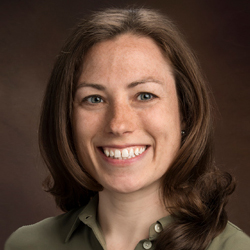
Suzanne P. MacFarland, MD
My research focuses broadly on cancer predisposition syndromes — genetic and/or inherited changes that lead to an increased risk of cancer. Affected families are often already dealing with a child with cancer, and then they must consider risk of secondary cancers and risks to other children and family members. I research ways to improve diagnosis and screening for these patients, particularly those who develop polyps as children, with long-term risk of gastrointestinal cancer, and those with Li-Fraumeni Syndrome, which has a lifelong risk of many different cancer types.
I entered the field of pediatric oncology wanting to treat children with cancer, and I found that often the bigger questions of “why did this happen” and “will this happen again to my child?” asked by every family at start of treatment were questions that I wanted to answer. This led me to the world of cancer predisposition. The ability to work in a translational research setting has been incredibly rewarding, whether it is tracking clinical outcomes, testing samples obtained from families for novel genetic changes, or modeling the genetic changes that I find within those families.
My advice would be to pursue the career that makes you passionate, and find people who share that passion and support you in your goals. A career that you value and pursue for your own reasons — that makes you want to get out of bed in the morning — will continue to motivate you despite any obstacles or challenges that you may face. And just as important as your own passion are the people, the peers, the mentors, the coworkers, who make that work feel meaningful, who inspire you to be your best self, and who support you when you are struggling.
I have been incredibly fortunate in the friends, family, peers, teachers, and mentors in my own life, who have believed in me and motivated me, and who have been honest with me each step of the way. And I am incredibly fortunate to work within a community at CHOP where everyone has the same drive to care for children and their families, and ease their burden through the most difficult moments.
Stay tuned for our second installment of this two-part series and don’t miss our 2019 and 2018 featured women in STEM galleries.